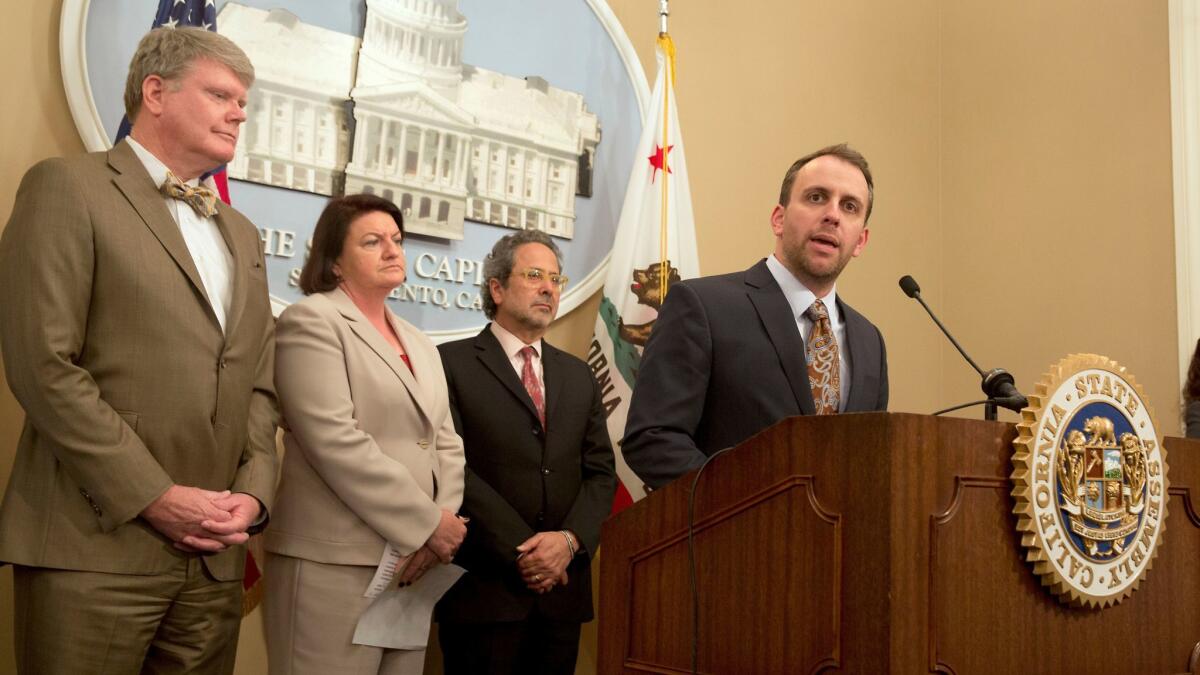What housing crisis? Last-minute bill would let wealthy Marin County limit home building

Reporting from Sacramento — One of California’s wealthiest counties may continue to get a pass under the state’s affordable housing laws.
Lawmakers are considering a measure that would allow parts of Marin County to limit growth more tightly than other regions of California. The provision, inserted last week into a bill connected to the state budget, lets Marin County’s largest cities and unincorporated areas maintain extra restrictions on how many homes developers can build.
Housing advocates say the carve-out runs counter to the push by Gov. Jerry Brown and lawmakers for more development as a way to combat the state’s housing affordability problems.
Since the changes are tied to last week’s passage of the state budget, which Brown has yet to sign, the measure does not have to go through the regular committee process. It’s had just one public hearing and lawmakers could vote on the bill as early as Thursday.
The measure, Assembly Bill 121, is the latest salvo in a lengthy debate about low-income housing in the Northern California county, which has one of the state’s largest gaps between rich and poor.
Following a 2009 investigation by federal housing officials, Marin County supervisors agreed to boost affordable development as a way to desegregate the mostly white region. But neighborhood opposition to low-income housing continued, including a long-stalled 2013 proposal from “Star Wars” creator George Lucas to build hundreds of affordable units on a former dairy farm.
Today, the county’s per capita income of $60,236 is the highest of any county in the state, according to U.S. census figures. But the average renter in Marin County makes just $19.21 an hour and would need to work 77 hours a week to afford a studio apartment at the $1,915-a-month market rate, according to data from the National Low Income Housing Coalition.
The bill came at the request of Assemblyman Marc Levine (D-San Rafael). Levine said his proposal reflects Marin County’s character: Communities there should have buildings that look like those in Santa Rosa and Petaluma rather than those in the larger cities of Oakland and San Francisco.
“If you’re standing on the ground there, it’s a suburban county and then if you were to hike a couple of miles west, you would see that it is a rural county,” Levine said.
Brown and legislators have been working on a package of bills that aim to increase funding for low-income housing as well as wipe away some of the restrictions local governments put on development. But no significant measure has passed in recent years, frustrating housing advocates.
“In a year where the Legislature has been talking endlessly about the housing crisis in this state and trying to make it easier to build affordable housing and higher-density housing, the one and only thing that comes out of the budget process is a deeply flawed measure that only adds barriers to development in one of the most exclusionary counties in the state,” said Anya Lawler, policy advocate at the Western Center on Law & Poverty.
Levine agrees Marin County has an affordable housing crisis, and argued the bill would actually help make it easier to build.
The budget-related legislation extends a law written by Levine in 2014. The original law allowed the cities of Novato and San Rafael, as well as unincorporated Marin County, to shrink the size of projects they’d allow developers to build to below roughly three stories high. That would be more generous than what other areas of California are allowed under state housing law.
Generally, affordable housing developers need to build larger projects for them to be financially viable. But some affordable housing groups in the region supported Levine’s initial effort because they believed smaller sizes might limit some community opposition.
Beyond that, Levine said, land in the county is very expensive and smaller projects can avoid costs often associated with larger buildings, such as steel construction and underground parking.
Levine’s original law was supposed to expire at the end of 2023. But under AB 121, the lower-density rules would continue for five years after that.
Housing advocates who are against his bill don’t understand how affordable housing can get done in his district, Levine said.
“There are ideologues in housing,” he said. “What I’m most interested in is pragmatic approaches that result in more housing for the people that need it.”
Some who supported Levine’s initial approach now are against AB 121. Michael Lane, policy director for the Non-Profit Housing Assn. of Northern California, said Levine’s new bill doesn’t make sense.
The original law required Novato, San Rafael and Marin County to analyze its effects on affordable construction by 2019. Lane said there is no reason to extend the law’s provisions before knowing whether it has worked.
“It’s way too early,” Lane said. “We don’t understand why this became a priority and why all the other housing issues didn’t.”
At the measure’s hearing before legislators Tuesday, Sen. Jim Nielsen (R-Gerber) criticized the bill, calling out what he said were “hypocritical” communities that don’t want to do their part in solving the housing problem. “They love their lifestyles, but don’t bother us with the low-income housing,” Nielsen said of those local residents.
Brown and the legislative leadership typically agree on budget-related bills before they’re introduced. Levine said he was able to get his housing provision into such a bill because “that’s just the way it evolved.”
Spokespeople for Brown, Assembly Speaker Anthony Rendon (D-Paramount) and Senate President Pro Tem Kevin de León (D-Los Angeles) either declined to comment or gave no substantive response to the bill.
“It got put in,” said Kevin Liao, a Rendon spokesman. “It’s the nature of the budget negotiations.”
ALSO
There’s no major boost to housing funding in next year’s California budget
California Senate passes package of bills aiming to address housing crisis
Updates on California politics











